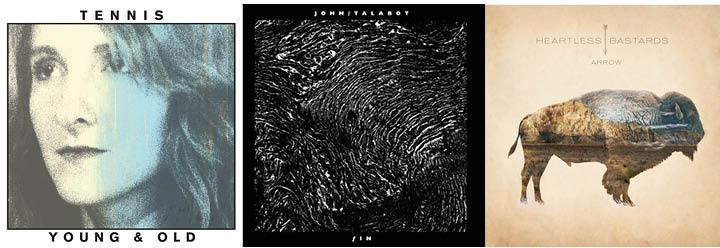February Album Release Grab Bag
February 15, 2012

In the summer of 2010, the Denver-based lo-fi husband and wife duo of singer Alaina Moore and guitarist Patrick Riley aka Tennis, allowed listeners to travel along with them as first mates via headphones, with the pair sailing up and down the Atlantic seaboard. The result of that trip is their successful debut album, “Cape Dory”; a set of songs that grew out of an East Coast summer and watered by the splashing white-capped waves off the South Carolina coast. “Dory” was a front-runner in the pack of breezy beach albums that came out that year, featuring lyrics of love under a mossy moonlight in the Palmetto State or sailing to an unknown cove.
Whereas “Dory” is adventurous in the sense that Tennis sailed the high seas for inspiration, their recent album, “Young & Old,” ground the duo a good distance away from the eastern seaboard in Nashville where they’ve traded in their sea legs for a bit of sixties soul.
Produced by Black Keys drummer Patrick Carney, “Young & Old” still retains the group’s signature? and the Mysterians’-like organ and surf punk sensibility but clearly lets it all hang out. “Young & Old” is the sensual string bikini needed to garner some wanted attention versus “Dory’s” simple but safe one piece. The tempos vary from spontaneous Phil Spector sputter to thumping groove that allows the group to dial down and sink into an attitude that is one part beach bingo and another Motown soul. Moore’s vocals, particularly in “Petition,” are more head swiveling and finger wagging on “Young & Old” giving her the title as a contender for one of the most talented yet under appreciated female voices out there.
But what’s great about this album is that you can still dance and bounce like a “Scooby Doo” character while wearing black Ray Bans and smoking a Lucky Strike cigarette. It’s sweet yet loose and punchy enough to be considered semi-aggressive. “Young & Old” is the buxom and brown eyed pin-up with a bee hive haircut from 1965 who asks you to have a go at it on the beach; a full on, straightforward assertion where there are no questions asked, besides thinking how you’ll get sand out of your bathing suit the morning after.
The Spanish producer stays true to the traditional course house music has taken since the early 1990s. Although minimalist, the genre has room enough for melodic shifts in tone and attitude, something Talabot has captured perfectly with “fIN” through samples and various loops that epitomize the early ’90s club scene. Centered in Barcelona, the Spanish influence matches the opportunity given to make it original and Talabot’s own, complete with beats that could easily be transferred onto the most nostalgic of Tropicale percussion and rhythm.
Talabot also recruits from his circle of electro pop friends featuring Madrid artist Pional on “Destiny,” a sexual in-the-dark romp that is straightforward in its musical pattern but questionable in terms of how long you want to dance to the one track, whether it be all night or for the next week. Talabot also gets help from Delorean’s Ekhi Lopetegi on “Journey”—a sentimental shift that really dances nicely on the playfulness of Lopetegi’s voice, sounding like an unreleased Delorean track.
“fIN” is the type of album you don’t want to over analyze; it needs to simply be played in its entirety. Much like a 24- hour dance party set on the beaches of Ibiza, the album needs to flow and be listened to as one collective. Separate songs work just fine, but the real reward is in the transition each song either shares or deviates from one another.
Heartless Bastards
“Arrow” Feb. 14
![]()
“Arrow” is dialed down from “The Mountain” but not by much. Every song has some sort of soaring guitar work that exemplifies the Bastards’ formula for three chord rock riffs reminiscent of Neil Young and Crazy Horse. Wennerstrom toils with Americana in the way farmers toiled with the Dust Bowl, plucking away acoustic ballads like “Low Low Low” and “The Arrow Killed the Beast.” There’s a noticeable amount of dirt and grit on “Arrow” that “The Mountain” lacks. From that journey from Dayton to Austin, I’d like to think Wennerstrom stopped at a local Baptist church for a shower, but got a Gospel lesson instead.
But everything isn’t honky tonk and tumble weeds; the group explores the sides of T. Rex in “Got to Have Rock and Roll” while “Down in the Canyon” might as well be “Down in the Pits of Hell,” a track the boys of Sabbath would be impressed with. “Arrow” is a solid rock album that sticks to what the Bastards’ do best, and that’s simple songs with no dizzying effects or over the top drives of distortion. Wennerstrom’s inner 13-year-old learning how to play guitar comes out, constantly rediscovering the music that has moved her through the years while also paying an indebted homage to it.








